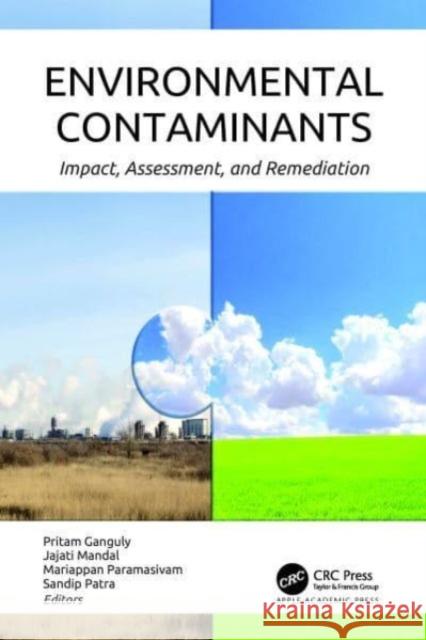Environmental Contaminants » książka



Environmental Contaminants
ISBN-13: 9781774913963 / Twarda / 2024 / 356 str.
Looks at the impact, assessment, and remediation of various environmental contaminants. It discusses the environmental changes that can occur, the remedial phytoremediation and green approaches for contaminant removal, the role of nanotechnology in remediation, and agronomic intervention for mitigation of environmental pollutants.
Wydanie ilustrowane
<b><i>“Heavy metals, pesticide residues, microplastics, pharmaceutical medicines, and other new and emerging environmental pollutants have been covered in depth in this book . . . The interaction of these pollutants with various critical environmental processes has been addressed in detail. This book also includes information on the pollutants’ toxicity and human health risks. Intensive technologies, bringing the most sophisticated science to reduce the detrimental impacts of persistent pollutants, have been discussed. Perceiving pollution as transboundary and global, this interdisciplinary approach provides pertinent details about significant pollutants and their environmental consequences, allowing the readers to build a solid foundation of knowledge. . . . [T]his book will inspire and widen the perspective of the students, researchers, policymakers, and stakeholders.” </b></i>”
—From the Foreword by Debapriya Mondal, PhD, Principal Epidemiology Scientist, Environmental Epidemiology Group, Chemical and Environmental Effects Department, Radiation, Chemical and Environmental Hazards Directorate, UK Health Security Agency
1. Basics of Environment, Pollution, and Bioremediation Techniques 2. Food Chain Arsenic Contamination in West Bengal, India: Accumulation, Distribution, and Human Health Risk 3. Lead, Cadmium, and Chromium Contamination in Soil-Plant Systems: Global Situation, Impact, and Dietary Risk Delineation 4. Origin, Distribution, Fate, and Remediation of Microplastics in Biowastes and Biowaste-Amended Soil 5. Herbicide Contamination in Groundwater and Their Probable Remediation 6. Fluoride Contamination in Ecosystem and Mitigation Strategy 7. Impact of Pharmaceutical Contaminants in the Environment 8. Environmental Pollution Due to Improper Use of Chemical Fertilizers and Their Remediation 9. Methods of Trace Analysis for Persistent Pollutants 10. Phytoremediation: A Novel Strategy to Decontaminate Environmental Pollution 11. The Headway of Nanotechnology-Mediated Approaches Towards Environmental Clean-Up 12. Balanced Nitrogen Fertilization in Paddy for Sustainable Production and Environmental Gain 13. Advancement in Pesticide Formulation Technology for Reducing Load of Contaminants
Pritam Ganguly, PhD, is working as Assistant Professor-cum-Junior Scientist in the Department of Soil Science & Agricultural Chemistry, Bihar Agricultural University, Sabour, Bhagalpur, Bihar, India. He earned his PhD in Agricultural Chemicals from Bidhan Chandra Krishi Viswavidyalaya. He has received Young Scientist Awards from reputed societies. He has sound expertise in analyzing trace amounts of organic pollutants in different components of the environment and published several research as well as review articles in reputed journals. Monitoring of pesticide residue in food items and prediction of safety risk are his key interests of research.
Jajati Mandal is presently pursuing his PhD in the School of Science Engineering and Environment, University of Salford, Manchester, United Kingdom, after being selected for a Netaji Subhas International Fellowship from the Indian Council of Agricultural Research (ICAR) in 2020. His area of research is heavy metal contamination (arsenic) and micronutrients and modeling with machine learning algorithms. He joined the Department of Soil Science and Agricultural Chemistry, Bihar Agricultural University, Sabour, in 2012 as Assistant Professor-cum-Junior Scientist. He has been the principal investigator of one nationally funded project from the Science Engineering and Research Board (SERB), DST, GOI and two state funded projects. He has published 26 research papers in journals of national and international repute. He was the recipient of a Young Scientist Award from the Indian Chemical Society in Environmental Chemistry section.
Mariappan Paramasivam, PhD, is working as Assistant Professor at Tamil Nadu Agricultural University (TNAU), Coimbatore, Tamil Nadu, India. He is handling DST- and GOI-funded projects in addition to two TNAU-funded projects. He has guided eight MSc and three PhD students as chairman and member of the advisory committee. He published more than 40 research papers, mostly in refereed journals of international repute, three books, and 10 book chapters at the national and international level. He listed at TNAU in the top 9th position of scientists having a Scopus H-index and was judged as Best Participant at the ICAR-sponsored Winter School. He reviews research articles for peer-reviewed journals published by Elsevier, Springer, American Chemical Society, and Taylor and Francis.
Sandip Patra, PhD, (ARS), presently working as Senior Scientist (Agricultural Entomology) in the Division of Crop Science, ICAR Research Complex for North Eastern Hill Region, Meghalaya, India. He received a National Scholarship during undergraduate and Senior Merit Scholarship during master’s degree program. He received the Smt. Hemangini Dutta Memorial Book Prize and a Certificate of Merit for securing the highest OGPA during his MSc (Ag.) in Agricultural Entomology. He received Young Scientist Awards and an Excellence in Research Award from reputed societies. He has advised three MSc (Ag.) students and published more than 50 research papers in many national and international journals of repute and two edited books. He also authored many popular articles, book chapters ,and training manuals. He is a member of professional societies and reputed journals.
1997-2026 DolnySlask.com Agencja Internetowa
KrainaKsiazek.PL - Księgarnia Internetowa









